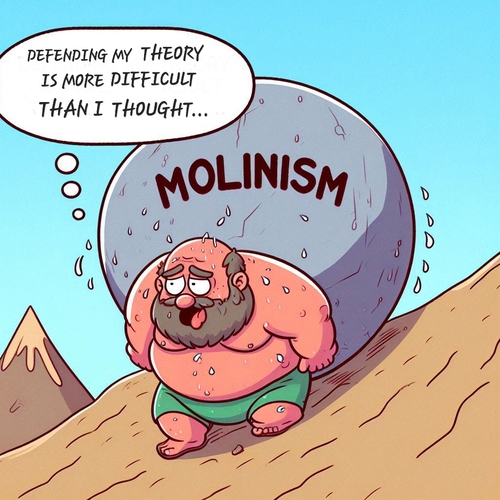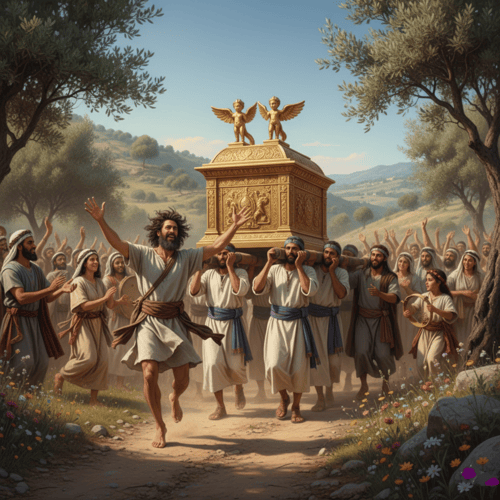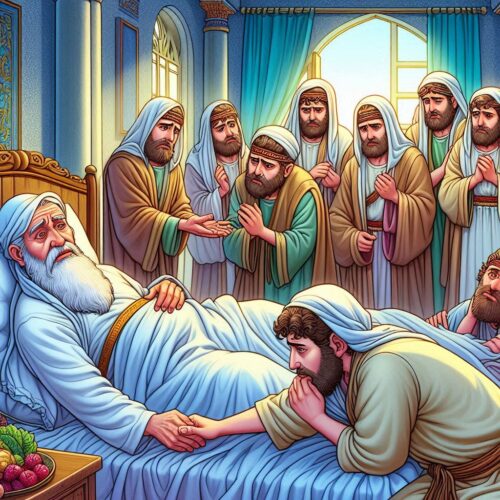Genesis 49: Does Jacob’s Blessing of Judah Point to Christ?
Picture the scene: an aged patriarch, dying in Egypt, gathers his 12 sons around his bed. What follows aren’t merely a father’s final words. They narrate a prophetic vision that was to shape the destiny of nations. In Genesis 49, Jacob’s blessing of Judah contains profound Messianic promises that Reformed theology has long recognised as pointing directly to Jesus Christ.
This passage marks a crucial moment in progressive revelation—the first clear indication that the coming Messiah promised to Abraham would emerge from Judah’s lineage.
FROM PROMISE TO PARTICULARITY: THE NARROWING PATH
God’s redemptive plan has always moved from the general to the specific. The Abrahamic covenant promised that “in you all the families of the earth shall be blessed” (Genesis 12:3). This blessing would come through Abraham’s seed—but which seed? The promise narrowed to Isaac, then to Jacob, and now in Genesis 49:10, it focuses like a laser beam on Judah.
This isn’t random selection but divine election working through human history. As Reformed theology emphasises, God’s sovereign grace operates through covenantal promises that span generations, each building toward the ultimate fulfillment in Christ.
THE ROYAL SCEPTRE: JUDAH’S KINGLY AUTHORITY
“The sceptre shall not depart from Judah, nor the ruler’s staff from between his feet” (Genesis 49:10a).
Jacob’s words were to prove remarkably prophetic. Judah emerged as Israel’s leading tribe, producing King David and establishing the royal line that would endure through Israel’s monarchy. Even after the Babylonian exile, when political kingship ceased, Judah maintained its tribal identity and leadership role—a preservation that defied historical precedent.
But Jacob’s prophecy reaches beyond earthly kingship. The “sceptre” represents permanent royal authority that finds its ultimate expression in Christ. The New Testament makes this connection explicit: Jesus is “the Lion of the tribe of Judah” (Revelation 5:5), and the writer of Hebrews notes “it is evident that our Lord was descended from Judah” (Hebrews 7:14).
David’s dynasty may have faltered, but the greater David—Jesus Christ—reigns forever. The sceptre that began with Judah finds its eternal fulfillment in the King of Kings.
THE MYSTERIOUS SHILOH: PEACE AND UNIVERSAL SUBMISSION
“Until Shiloh comes, and to him shall be the obedience of the peoples” (Genesis 49:10b).
The Hebrew word “Shiloh” has puzzled interpreters, but Reformed scholars have consistently understood it as a Messianic title meaning “peace-bringer” or “he to whom it belongs.” This interpretation aligns with the broader biblical theme of the Messiah as the Prince of Peace.
Notice the scope of this prophecy: “the obedience of the peoples”—not just of Israel, but of all nations. Jacob’s vision transcends tribal boundaries, anticipating the universal kingdom of Christ. This echoes Psalm 2:8, where God promises the Messiah: “I will give you the nations as your inheritance, and the ends of the earth as your possession.”
Jesus Himself claimed this universal authority: “All authority in heaven and on earth has been given to me” (Matthew 28:18). The Great Commission flows directly from this prophetic promise made to Judah.
ABUNDANCE AND PEACE: THE MESSIANIC KINGDOM
Jacob’s blessing continues with vivid imagery of prosperity: “Binding his foal to the vine and his donkey’s colt to the choice vine, he has washed his garments in wine and his vesture in the blood of grapes. His eyes are darker than wine, and his teeth whiter than milk” (Genesis 49:11-12).
These aren’t mere tribal blessings but glimpses of the Messianic age. The imagery speaks of abundance, peace, and prosperity that characterise God’s kingdom. When security is so complete that one can tie a valuable donkey to a grapevine without fear of theft, when wine flows so freely it’s used for washing—these are pictures of divine blessing that surpass ordinary human experience.
THE COVENANTAL FRAMEWORK: SEEING THE BIGGER PICTURE
Reformed theology emphasises Genesis 49 is to be understood within the broader covenant of grace. This isn’t an isolated prediction but part of God’s unfolding redemptive plan. The covenant made with Abraham, confirmed to Isaac and Jacob, now receives further specification through Judah.
Covenant theology recognises God’s promises operate through various administrations but maintain essential unity. Jacob’s prophecy about Judah represents a crucial step in the progressive revelation that culminates in Christ. The typological relationship explains why Judah’s history, with its mixture of triumph and failure, points beyond itself to Christ, who perfectly fulfils what Judah could only approximate.
JACOB’S BLESSING OF JUDAH: SCRIPTURE’S REDEMPTIVE ARC
Jacob’s blessing of Judah doesn’t stand alone but connects to a chain of Messianic prophecies. Balaam’s oracle speaks of “a star out of Jacob, and a sceptre out of Israel” (Numbers 24:17). Nathan’s covenant with David promises an eternal throne (2 Samuel 7:12-16). Isaiah prophesies of a Branch from Jesse’s root who will rule in righteousness (Isaiah 11:1-10).
Each prophecy adds detail to the Messianic portrait first sketched in Genesis 49. The New Testament writers understood these connections clearly. Matthew’s genealogy begins: “The book of the genealogy of Jesus Christ, the son of David, the son of Abraham” (Matthew 1:1), explicitly linking Jesus to both Abrahamic and Davidic covenants rooted in Jacob’s blessing of Judah.
LIVING UNDER THE LION OF JUDAH
Understanding Genesis 49:8-12 as Messianic prophecy carries practical implications for Christian living. If Jesus is indeed the Lion of Judah, the fulfillment of Jacob’s ancient blessing, then several truths emerge:
- Christ deserves our allegiance. The sceptre belongs to him by divine right, not human achievement. Our submission to his authority isn’t optional but the proper response to his identity as the promised King.
- We can live with confident hope. Jacob’s prophecy guarantees that God’s promises will be fulfilled. The same faithfulness that preserved Judah’s line through centuries of upheaval ensures that Christ’s kingdom will ultimately triumph.
- We’re called to participate in global mission. The “obedience of the peoples” isn’t just prophecy but commission. As citizens of Christ’s kingdom, we’re agents of the very expansion Jacob foresaw.
- We can endure present difficulties. Jacob’s blessing reminds us God’s plans span generations. What seems like delay to us is divine timing in the larger redemptive story.
JACOB’S BLESSING OF JUDAH: THE WONDER OF PROGRESSIVE REVELATION
Genesis 49:8-12 showcases the marvel of progressive revelation. A dying patriarch’s words, spoken in Egypt over three millennia ago, continue to resonate because they’re part of God’s eternal plan. Jacob spoke better than he knew, his prophecy carrying meaning that would unfold across centuries.
This is how Scripture works—each passage contributing to the unified story of redemption that culminates in Christ. When we read Genesis 49 with Christian eyes, we’re not imposing foreign meaning on the text but discovering the deeper significance that God intended from the beginning.
The Lion of Judah who is also the Lamb of God stands at the centre of human history, fulfilling every promise, satisfying every prophecy, and securing every blessing. Jacob’s ancient words still echo: “To him shall be the obedience of the peoples.” The question isn’t whether this prophecy will be fulfilled, but whether we’ll be among those who joyfully submit to the rightful King.
In Christ, Jacob’s blessing finds its “Yes” and “Amen” (2 Corinthians 1:20). The sceptre has not departed from Judah—it rests eternally in the hands of Jesus, the Lion of Judah, our King forever.
JACOB’S BLESSING OF JUDAH: RELATED FAQ
Why is “Shiloh” missing from most modern English translations of Genesis 49:10? Most contemporary translations (ESV, NIV, NASB) render the Hebrew as “until he comes to whom it belongs” rather than “until Shiloh comes.” This reflects advances in Hebrew scholarship and manuscript evidence, which suggest the original text may have meant “until he comes, whose it is”. However, the Messianic interpretation remains unchanged regardless of translation, as both readings point to a future ruler. The traditional “Shiloh” reading, preserved in the KJV and supported by ancient versions like the Septuagint, may represent an early interpretive tradition rather than the original Hebrew text.
- How do contemporary Reformed scholars view the timing of this prophecy’s fulfillment? Leading Reformed scholars like Tremper Longman III and John Sailhamer see Genesis 49:10 as having both historical and eschatological dimensions. They argue David’s kingship provided a partial fulfillment, establishing Judah’s royal pre-eminence, while Christ represents the ultimate fulfillment of the eternal sceptre promise. Gordon Wenham and Victor Hamilton emphasise the prophecy’s scope (“obedience of the peoples”) clearly transcends any Old Testament king, and require a Messianic interpretation. Most contemporary Reformed commentators reject purely futuristic interpretations, seeing the prophecy as inaugurated in Christ’s first advent and consummated at His return.
- What’s the significance of the lion imagery in Genesis 49:9, and how does it connect to Revelation? Genesis 49:9 calls Judah “a lion’s cub” who “crouches and lies down as a lion.” This establishes the lion symbolism that follows Judah throughout Scripture. This imagery represents strength, royalty, and dominance—qualities that make Judah the natural leader among the tribes. Revelation 5:5 deliberately echoes this passage by calling Christ “the Lion of the tribe of Judah,” creating a clear typological connection. The lion symbolism bridges Old and New Testaments, showing how Christ embodies the strength and royal authority originally attributed to Judah’s tribe.
Did Jacob’s other sons receive any Messianic blessings, or is Judah unique? While several of Jacob’s sons received significant blessings (Joseph’s double portion, Levi’s priesthood), Judah alone receives explicitly royal and Messianic language. Benjamin is called a “ravenous wolf,” Zebulun gets commercial prosperity, and Issachar becomes a labourer, but none receive promises of eternal dominion or universal submission. This exclusivity is crucial for understanding biblical theology—God’s sovereign election narrows the Messianic line specifically through Judah. Later Scripture confirms this unique status: the Messiah comes from Judah’s tribe, not from the other eleven.
- How do we reconcile Jacob’s blessing with Judah’s serious moral failures? Reformed theology emphasises God’s covenant promises depend on divine grace, not human merit. Judah’s involvement in selling Joseph, his encounter with Tamar, and other moral lapses demonstrate God’s election operates despite human sin. This actually strengthens the Messianic interpretation—if the blessing depended on Judah’s righteousness, it would have failed immediately. Instead, God’s faithfulness to his promises, even through flawed human instruments, points to the need for a perfect descendant who would succeed where Judah failed. Christ’s sinlessness fulfils what Judah’s imperfection could only prefigure.
- What role does the concept of “firstborn rights” play in understanding Judah’s blessing? Though Judah was Jacob’s fourth son, he effectively receives the leadership rights typically belonging to the firstborn. Reuben forfeited his birthright through moral failure (Genesis 35:22), and Simeon and Levi lost theirs through violence (Genesis 34). This demonstrates God’s sovereign choice overriding natural birth order—a theme that runs throughout Genesis (Isaac over Ishmael, Jacob over Esau). Contemporary Reformed scholars like Bruce Waltke see this as highlighting God’s grace in election, where divine choice rather than human merit determines covenant blessings. The “firstborn” theme connects to Christ as the “firstborn of all creation” (Colossians 1:15).
How does Jacob’s blessing relate to the land promises made to Abraham? While Abraham received promises about the land of Canaan, Jacob’s blessing of Judah focuses on kingship and dominion rather than territorial inheritance. However, Reformed scholars note these aren’t contradictory but complementary aspects of the same covenant. The sceptre promise implies authority over territory, and the “obedience of the peoples” suggests dominion extending beyond Canaan’s borders. Reformed theologians like Michael Horton argue Christ’s kingdom fulfils both the land and sceptre promises—the “land” finds its ultimate expression in the new heavens and new earth under Christ’s eternal rule.
JACOB’S BLESSING OF JUDAH: OUR RELATED POSTS
- Wrestling with Identity: When God Asks Jacob His Name
- The Mystery Duel at Peniel: Why Would God Wrestle with Jacob?
Editor's Pick

Did Joseph Sin in Marrying an Egyptian?
It’s a troubling question: if God forbade His people from foreign alliances, why was Joseph’s marriage to an Egyptian not [...]

Jacob’s Ladder: How Jesus Bridges Earth and Heaven
THE GOSPEL IN GENESIS 28... A stairway to heaven—humanity has always dreamt of one since the Fall. Every religion offers [...]

In the World But Not Of It: What John 17:14-16 Really Means
Scrolling through social media, we’re bombarded by voices shouting for our allegiance—politics, trends, ideologies. As Christians, we feel the tension: [...]

Is Molinism Biblical? Reformed Challenges to Middle Knowledge
In a world craving autonomy, does God truly reign supreme, or does He negotiate with human choices? The question lies [...]

Does the Bible Teach Purgatory? Scripture’s Clear Answer
Imagine standing at the very edge of eternity, wondering if the soul requires further cleansing before you enter heaven's gates. [...]

David Danced Before the Lord—Why Don’t Reformed Churches?
When we read about King David leaping and dancing before the Lord “with all his might” (2 Samuel 6:14), a [...]

Faithful to the Pattern: Why Paul Reserves Ordination for Men
Few topics in contemporary Christianity generate more tension than women’s ordination. This question touches real lives, genuine callings, and deeply [...]

‘Flee Sexual Sin’: Why Does Paul Single This Sin Out?
When the apostle Paul writes to the Corinthian church, he doesn’t tell them to simply avoid sexual immorality or resist [...]

Does Denying God’s Sovereignty Mean Denying the Gospel?
RC Sproul once warned denying God’s sovereignty “eviscerates” grace—a strong word meaning to gut or disembowel something, leaving only an [...]

Why Christians Fast: The Biblical Discipline’s Very Real Rewards
Why would Christians, who rejoice in the good gifts of food and fellowship, deliberately choose to go without? Isn’t fasting [...]
SUPPORT US:
Feel the Holy Spirit's gentle nudge to partner with us?
Donate Online:
Account Name: TRUTHS TO DIE FOR FOUNDATION
Account Number: 10243565459
Bank IFSC: IDFB0043391
Bank Name: IDFC FIRST BANK






